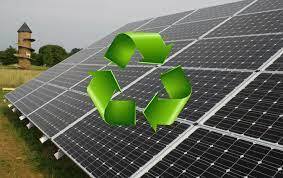A Complete Guide To Solar Panel Recycling
الجسم
Many Americans are now investing in solar power to reduce their dependence on oil and fossil fuels as the impacts of climate change become increasingly dire. With benefits like never before, the positives of solar energy are now much more well known than in previous years.
The most common alternative energy source is solar power because it doesn't produce greenhouse gases or toxic pollutants after panels are installed.
However, while many people are familiar with the benefits of solar energy and solar panel recycling, not much is discussed what happens to these panels when they are no longer being used.
ARE SOLAR PANELS BAD FOR THE ENVIRONMENT?
Solar power is an abundant and reliable energy source that can generate clean, sustainable electricity. When done correctly, solar panels can provide the maximum amount of power without causing global pollution or warming the environment. For example, when using solar installers for solar energy for electricity, there aren't any harmful emissions polluting the environment like there might be when using coal or burning gas. Going green may be more expensive than some other methods. Still, it carries a greater benefit overall since you see immediate results – cutting down on your bills and carbon footprint and reducing negative impacts on the climate.
ARE SOLAR PANELS TOXIC?
While solar panels do require hazardous chemicals in their manufacturing, as long as companies follow federal safety regulations, solar panel manufacturers will keep their workers safe. If a business is not involved with proper recycling protocols, it will violate the law and further compromise both human health and the environment through potentially toxic fumes. Fortunately, solar panel manufacturers have many financial incentives to take these necessary precautions to avoid such penalties. Solar panels benefit the environment more than they harm it.
ARE SOLAR SUNSHINE COAST PANELS RECYCLABLE?
Yes! The option to recycle solar panels is possible and can be handled responsibly. Most of the materials that make up a solar panel are recyclable, including glass, plastic, aluminum, silicon, and metal. While recycling solar panels can be difficult in some cases, it's getting easier as time goes on. New methods for recycling solar panels are currently being explored and should continue to be so in the future.
THE IMPORTANCE OF SOLAR PANEL RECYCLING
Recycling solar panels is important for two reasons. First, it reduces the amount of waste going into landfills, and second, it allows us to reuse valuable components that we can use again. Solar panel recycling is possible because most of the parts used in solar panels are recyclable, like selenium, germanium, tellurium, cadmium, gallium, and indium. So why not recycle them? The International Renewable Energy Agency predicts that the global cost value of recycled raw materials from old solar panels will reach $450 million by 2030. That's more than enough to make 60 million new solar panels, and thus using recycled materials instead of making new ones is a significant chance for our planet!
SOLAR PANEL REUSE: CAN SOLAR PANELS BE REUSED?
Solar panels are one of the greenest and most environmentally friendly products today. But everything has a limited lifespan, and eventually, solar panels need to be replaced or recycled before working as efficiently as in their hay day. However, this doesn't mean that you should rush to get rid of them! Older, reused, and low-efficiency solar panels still have many uses that don't require massive energy, like making street lamps glow with light or charging some electronics in a power outage.
Consider donating your older solar panels to a company specializing in repurposing them. A common use of old solar panels is for building things like gardens and greenhouses, which still need sunlight to grow. You could also donate your old panels to a friend or neighbor who might have use for them. Instead of investing in all-new materials, repurpose your solar panels by incorporating them into the structure of your greenhouse to keep your plants warm during the colder months when it's not quite as sunny outside!
CONTACT ACCORD ELECTRICAL TO LEARN MORE
The benefits of solar power could be nullified if we don't pursue more effective, far-reaching recycling methods. It's more important than ever to seek out new ways to recycle old solar panels so that they do not end up in landfills. At the end of their lifespan, it is also very important to repurpose these panels instead of selling them for scrap or giving them away to people who might not know how dangerous they are.
Source URL: https://www.accordelectrical.com.au/












تعليقات